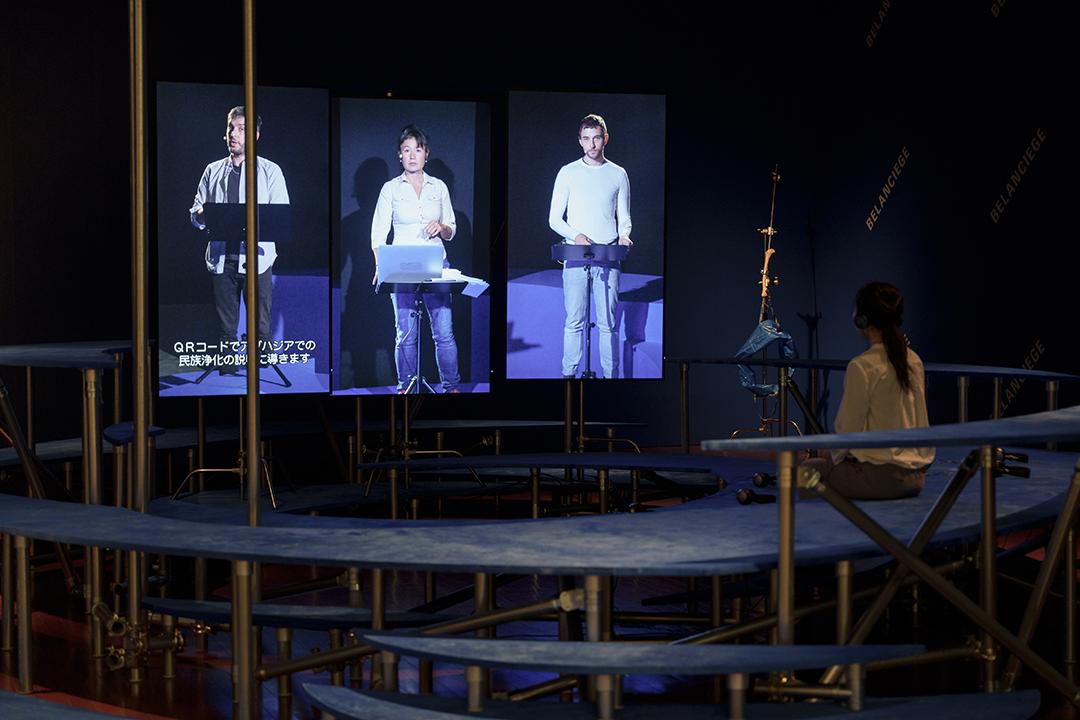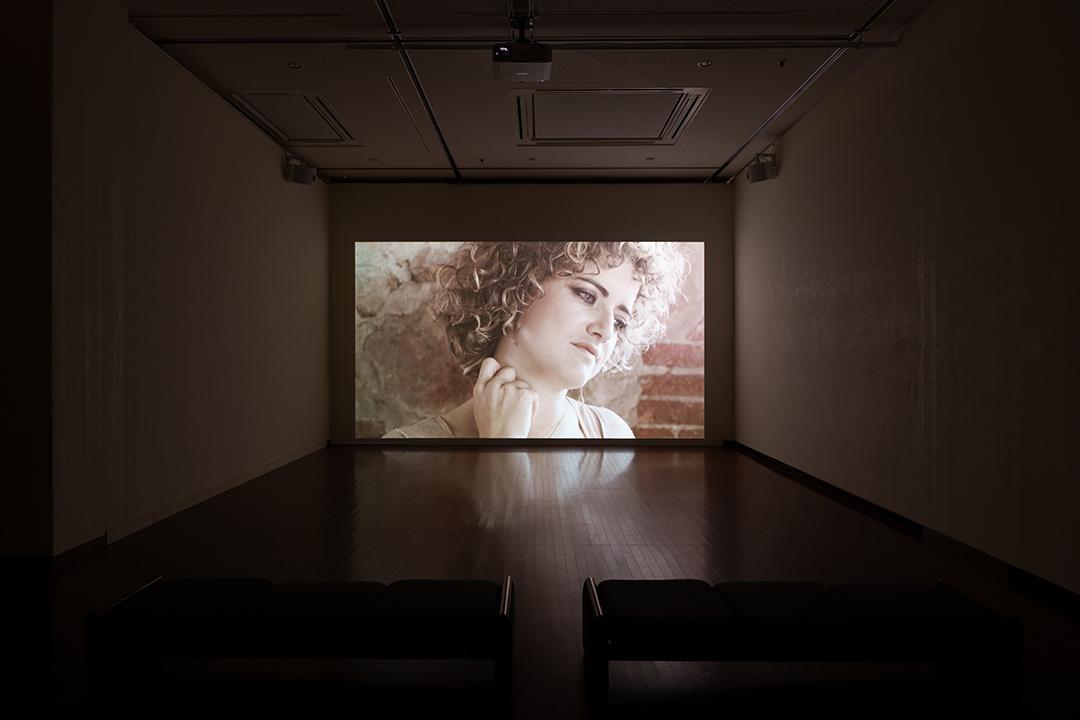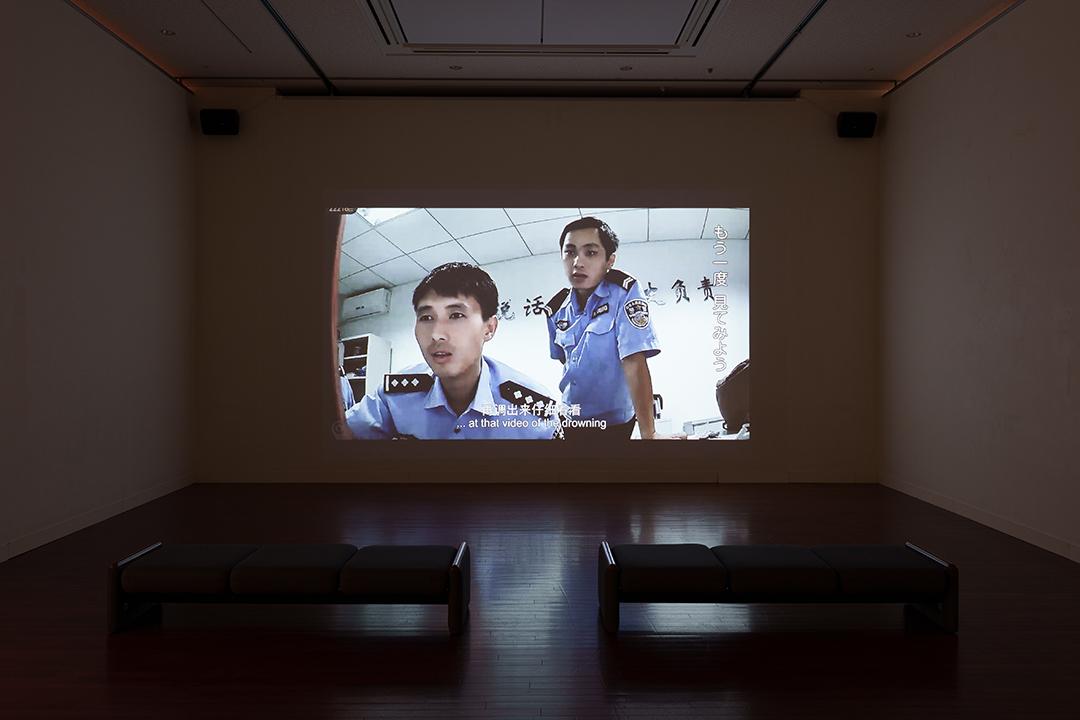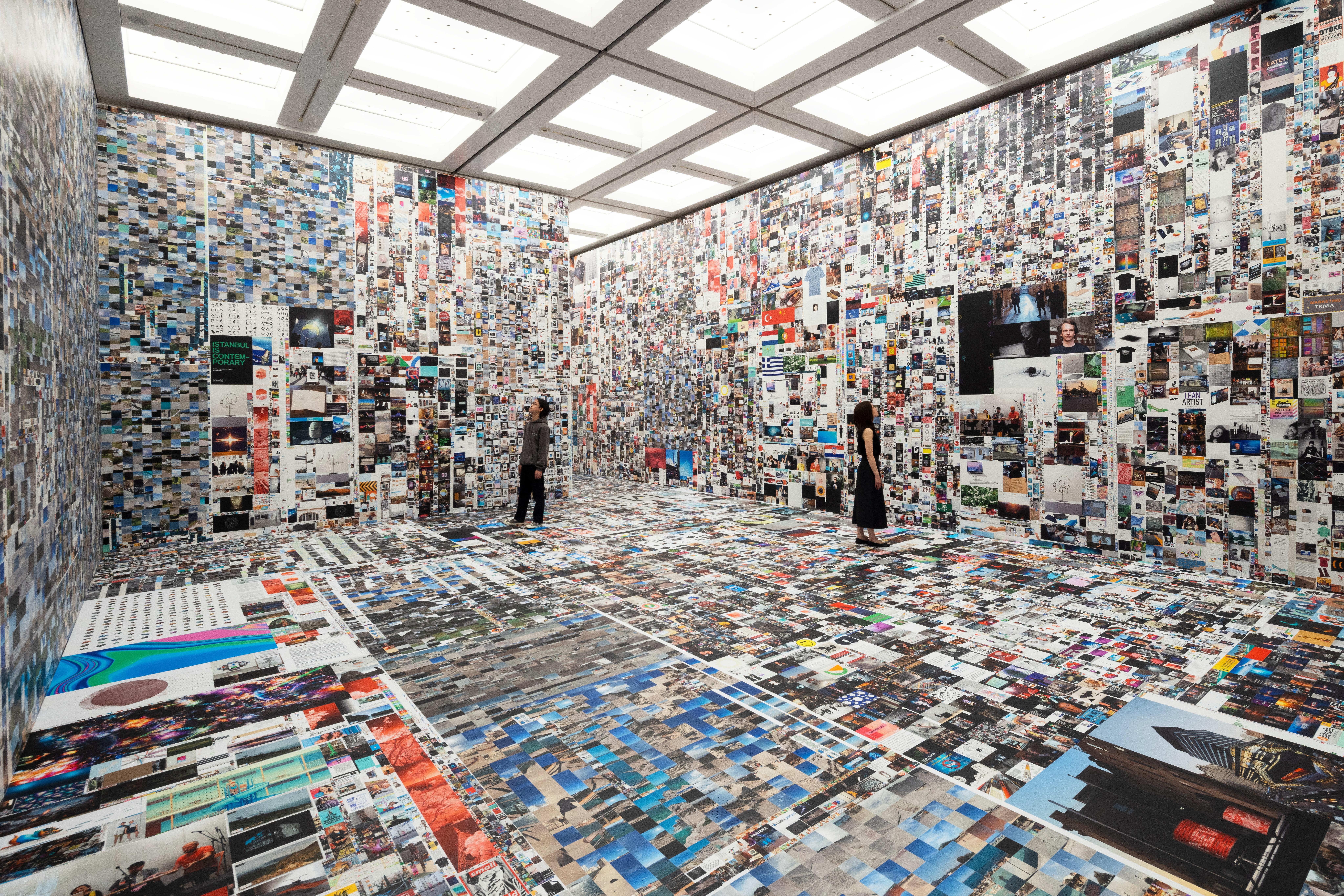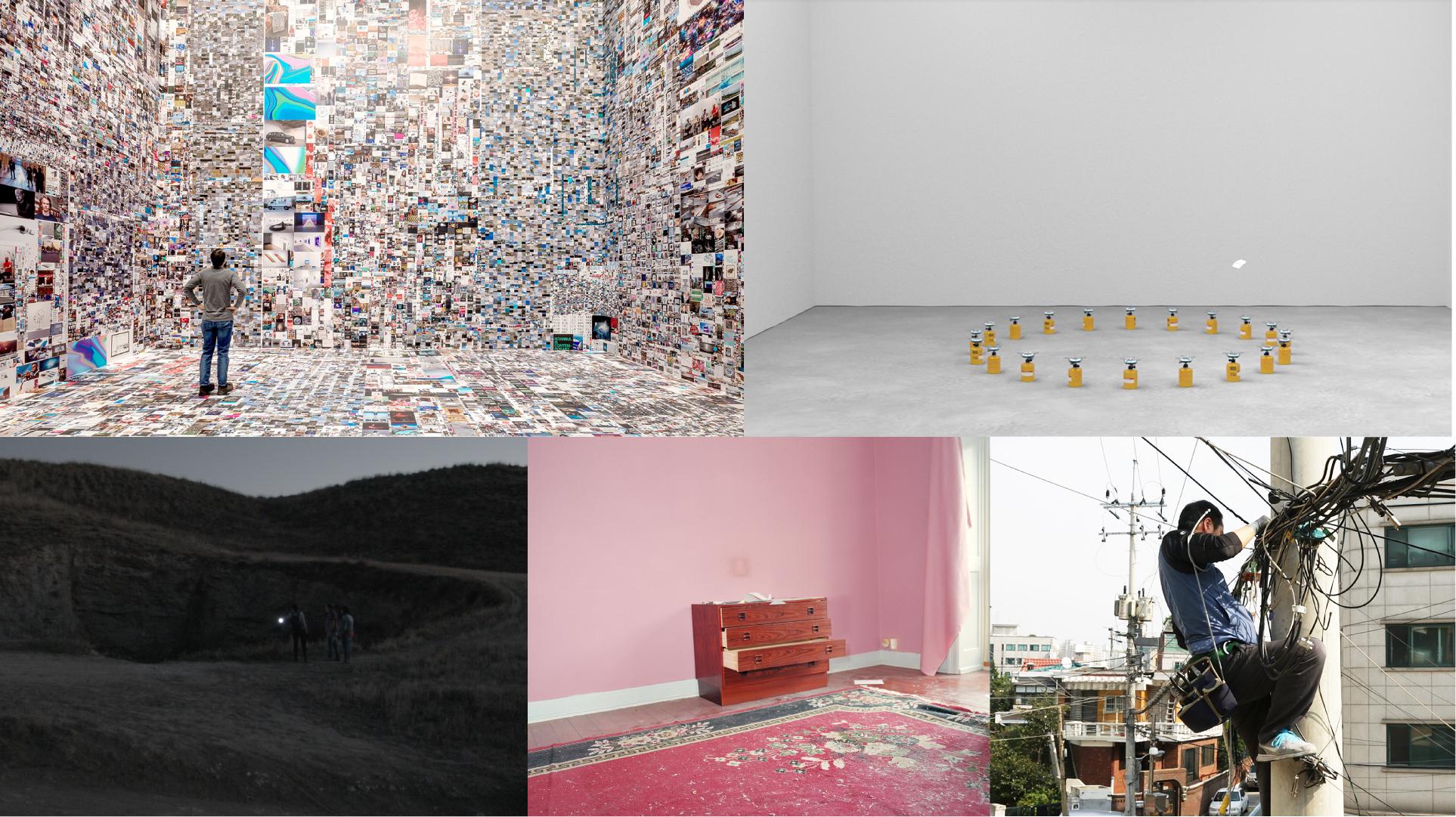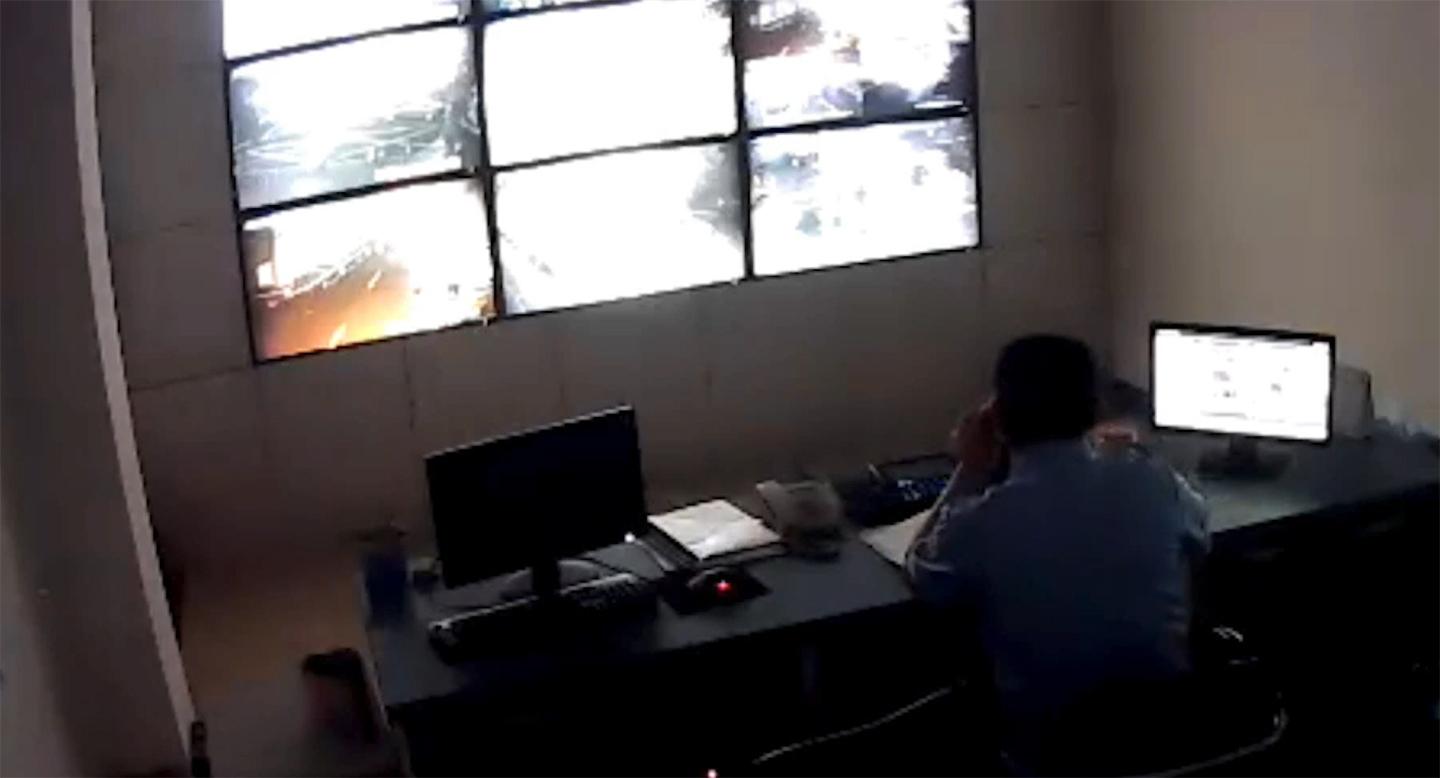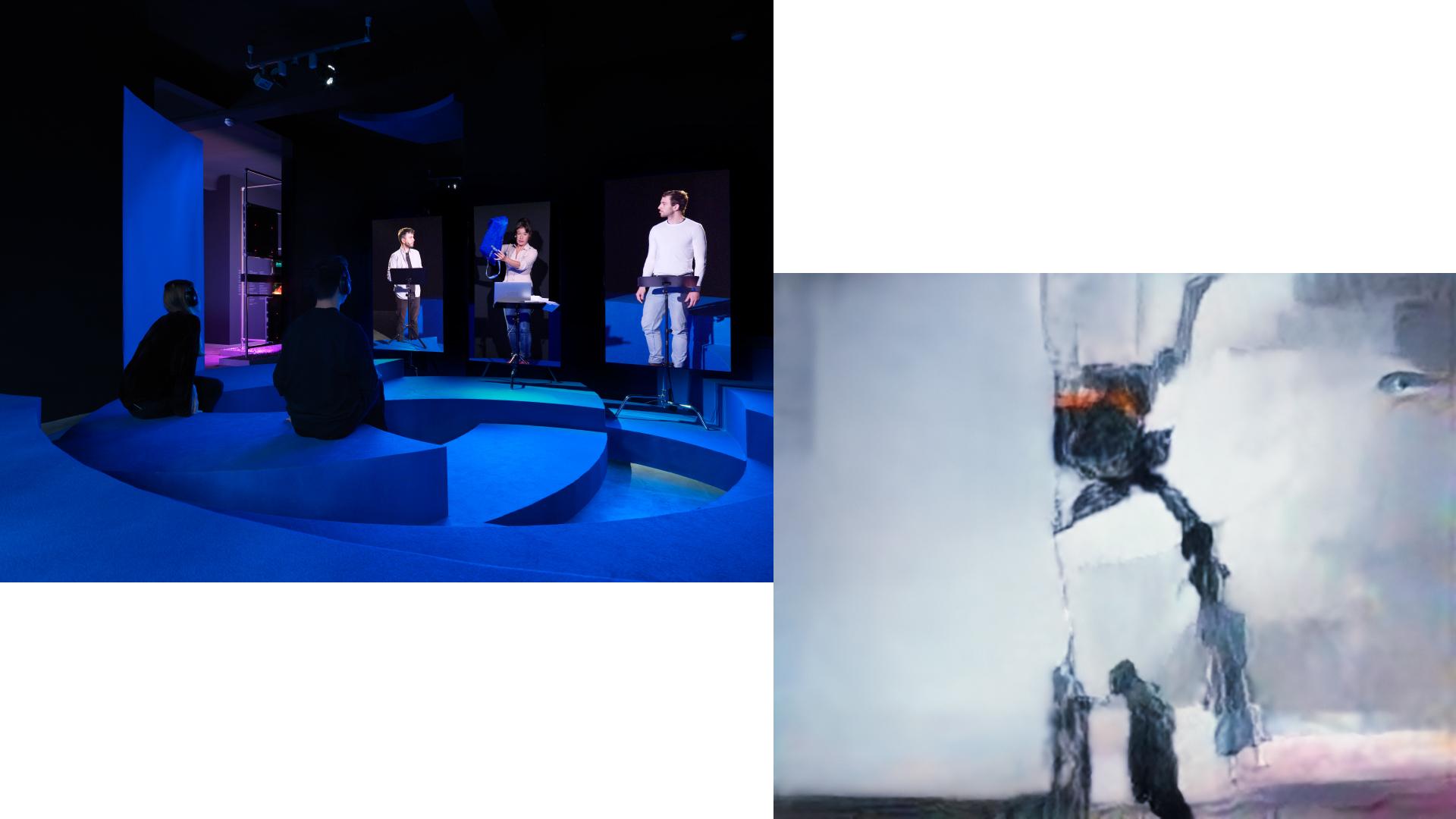Universal / Remote
March 6 (Wed), 2024 - June 3 (Mon), 2024
- Past Exhibitions
- Special Exhibitions
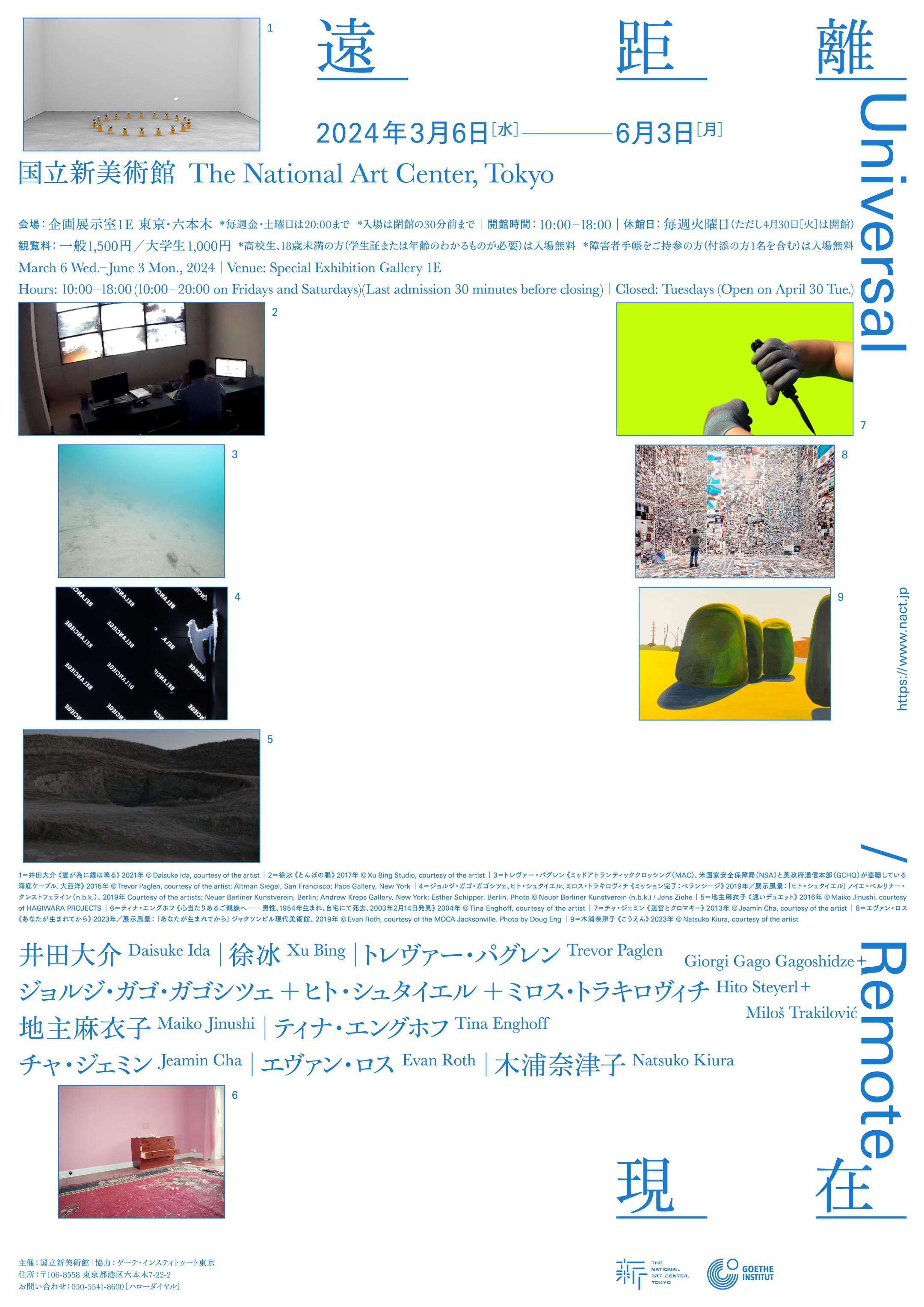
Giorgi Gago Gagozhidze, Hito Steyerl, Miloš Trakilović, Mission Accomplished: Belanciege, 2019
Installation view of the exhibition “Universal / Remote”, The National Art Center, Tokyo, 2024 Photo by Keizo Kioku
Since the late 20th century, people, capital, and information came to move on a global scale. We entered a new phase in the 2010s along with the proliferation of smart devices and issues such as excessive tourism, shifting of industry’s production costs and environmental impact to developing nations, the digital divide and so forth were only worsening as the 2020s dawned. And while the outbreak of a pandemic that recognizes no borders suddenly put the brakes on the movement of people, the limitless flow of capital and information showed no sign of stopping. In fact, it seems we are seeing the true visage of capital and information systems for the first time. The rich and the poor, the powerful and the powerless: imbalances in our world are becoming more explicit all the time.
The exhibition title Universal / Remote references prevailing conditions in the 21st century as capital and data flow freely on a global scale. Conveying comical aspects of the excesses of surveillance and high-tech networks, as well as the profound isolation of human beings, works in this exhibition seem to grapple head-on with the current era and with the post-COVID world. The exhibition presents the works of 8 artists and a group of 3 artists that address the state of society in the 21st century as shaped by the conditions described above, focusing on two concepts, “Constant Growth at a Pan-Global Scale” and “The Remote Individual.”
Overview
- Period
-
March 6 (Wed), 2024 – June 3 (Mon), 2024
Closed on Tuesdays
*Open on April 30 (Tue.) - Opening Hours
10:00-18:00
*10:00-20:00 on Fridays and Saturdays
*April 28(Sun.), May 5(Sun.)10:00-20:00
(Last admission 30 minutes before closing)- Venue
-
The National Art Center, Tokyo
Special Exhibition Gallery 1E
7-22-2 Roppongi, Minato-ku, Tokyo 106-8558 - Organized by
The National Art Center, Tokyo
With the support of
Goethe-Institut Tokyo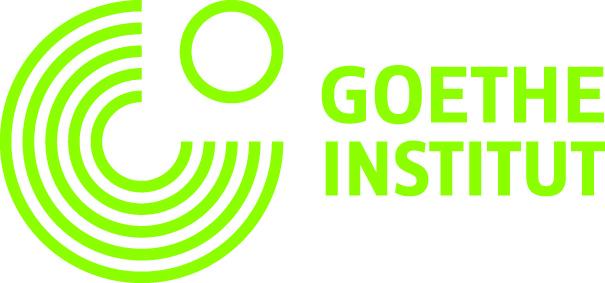
- Touring Information
Kumamoto: Contemporary Art Museum Kumamoto; October 7 (Sat.) - December 17 (Sun.), 2023
Hiroshima: Hiroshima City Museum of Contemporary Art; June 29 (Sat.) - September 1 (Sun.), 2024- Inquiries
(+81) 47-316-2772 (Hello Dial)
Admissions & Tix
| General | 1,500 yen (Adults), 1,000 yen (College students) |
|---|---|
| ONLINE TICKET | 1,500 yen (Adults), 1,000 yen (College students) |
* All prices include tax.
- Tickets are available at
・The National Art Center, Tokyo (on sale from March 6, open days only)
・ONLINE TICKET "e-tix" (on sale from 10:00, February 28) - Visitors who are under 18, including high school students, will be admitted for free.
- Disabled persons (along with the one assistant) will be admitted for free upon presenting the Disabled Person’s Booklet or an equivalent form of government-issued ID.
- Reduction (200 yen off) applies to visitors who present the ticket stub of a current exhibition at The National Art Center, Tokyo; Suntory Museum of Art; or Mori Art Museum (Art Triangle Roppongi). Please show the ticket stub at the "Universal / Remote" exhibition ticket booth.
- Students, faculty and staff, of “Campus Members”, can view this exhibition for 800 yen (students) and 1,300 yen (faculty/staff). Please purchase tickets at the "Universal / Remote " exhibition ticket booth.
-
Credit card (Master Card, VISA, JCB, AMEX, Diners Club, DISCOVER, 銀聯, QUICPay), e-cash (Suica, PASMO, ICOCA, etc.), iD, Union Pay are available for purchasing tickets.
About the Exhibition Title
This exhibition is a look back, through the lens of contemporary art, at the three years of the pandemic, which abated so recently but is already fading from our collective memory day by day.
Living in these globally interconnected times, it is difficult for us to perceive distance, but spatial and geographical distances can never be negated. During the pandemic, a two-meter distance between people was mandated, this being considered far enough to prevent aerial transmission of the virus. Meanwhile, the imposition of entry restrictions and travel bans revived our awareness of the distance between countries. Slowdowns in logistics reacquainted us, the inhabitants of Earth, with the reality of the planet’s vast distances. The pandemic forced us to recognize how far apart things are, a truth unnoticed or unacknowledged by so many in advanced nations. Many of us adopted remote work, which seemed to resolve or at least mask the distances between us, and as the pandemic waned, we rapidly lost our sense of distance once more.
The title Universal / Remote was devised to encourage us not to forget the perpetually distant realities of the present day. The phrase “universal remote” originally signifies a multi-functional remote control, but dividing it with a slash disrupts the implication of “universal effectiveness” and lays bare the dual aspects of universal (i.e. global) and remote (i.e. distant, contactless). This title conveys the conviction that is vital to remain aware of the sense of distance that came to the foreground during the pandemic, as well as the unchanged reality that we are all living separate lives.
Exhibited Highlights
Contemporary Art's Responses to the Pandemic
How did all of us experience the last approximately three years, starting in 2020 when the COVID-19 pandemic became a global crisis? How did society get where it is today? Through contemporary art, this exhibition will investigate possibilities for post-pandemic society and the state of the individual, and consider directions for the future.
Picturing How We Inhabit a Global Capitalist Society
This exhibition has a two-part structure, with Part 1 titled “Constant Growth at a Pan-Global Scale” and Part 2 “The Remote Individual.” While “Pan-” (i.e. “Universal” ) and “Remote” may seem worlds apart, they are not opposing concepts, but rather resemble two mirrors reflecting each other. The exhibition reinterprets existing themes in contemporary art from the perspectives of the global-scale “Universal” and the “Remote” that isolates flesh-and-blood humans and controls things from afar, addressing global capitalism and society's shift to a digital future.
Opportunities for Viewer Interpretation After Three-Plus Years of Crisis
Much of the art presented here was made not during the pandemic, but in 2019 or earlier. After the experiences of the last few years, can we ever view these works in the context in which they were first exhibited? These works, evoking the absurdities wrought by excessive surveillance and precision technology and the profound isolation of human beings within these systems, intrepidly confront both the current era and prospects for a post-COVID world.
Works by Internationally Active Artists Currently Making a Global Impact
Universal / Remote features a large number of works by artists based outside Japan. In addition to video art by Xu Bing, a renowned, globally active contemporary artist based in New York and Beijing, the National Art Center, Tokyo presents works by Hito Steyerl (in collaboration with Giorgi Gago Gagoshidze and Miloš Trakilović), who has been at the forefront of the international art scene since the 2010s; Trevor Paglen, who integrates cutting-edge science and technology with contemporary art; and Evan Roth, who applies a hacker mind to the creation of art in diverse media. Works by the Danish photographer Tina Enghoff, who spans the fields of photojournalism, fine art, and activism, and the up-and-coming South Korean video artist Jeamin Cha will be exhibited in Japan for the first time. We are also pleased to present a work by Maiko Jinushi that encompass both of the show's two key concepts, ambitious works by Daisuke Ida and new works by Natsuko Kiura including those created for this exhibition.
|
|
|
Exhibition Structure
Constant Growth at a Pan-Global Scale
Strengthening of state authority and public acceptance of surveillance systems, so as to prevent the spread of disease and curtail the flow of people across borders, have achieved results in addressing the issues at hand, but remain major points of contention for the post-COVID society of the future. One could say our sense of balance between state power and individual freedom is being tested like never before. However, capital and information are sure to continue moving around the globe with increasing rapidity and acting as relentless drivers of humanity. There have also been recent moves toward adoption of cryptocurrencies and blockchain-based NFTs (non-fungible tokens), mechanisms that enable society to function and continue expanding even when people are physically separated. This section of the exhibition features works that focus on such issues of capital and information.
|
|
The Remote Individual
Our society has continued to expand on a global scale even during a pandemic. However, strangely and paradoxically, isolation of the individual is also progressing. Today it is thoroughly commonplace for individuals to connect and reach across borders online, without leaving the comfort of their homes. The COVID crisis accelerated a paradigm shift toward the remote, and moving forward, our sense of geographic distance will surely continue to fade in the future. The figure of the worker laboring silently for the sake of a world to which he or she lacks connection, and will never see or actually visit, conveys isolation and profound loneliness, and this cannot fail to have a major impact on the human psyche. This section explores how people work and live in increasingly remote ways premised on contact-less interaction. Constant Growth at a Pan-Global Scale Strengthening of state authority and public acceptance of surveillance systems, so as to prevent the spread of disease and curtail the flow of people across borders, have achieved results in addressing the issues at hand, but remain major points of contention for the post-COVID society of the future. One could say our sense of balance between state power and individual freedom is being tested like never before. However, capital and information are sure to continue moving around the globe with increasing rapidity and acting as relentless drivers of humanity. There have also been recent moves toward adoption of cryptocurrencies and blockchain-based NFTs (non-fungible tokens), mechanisms that enable society to function and continue expanding even when people are physically separated. This section of the exhibition features works that focus on such issues of capital and information.
|
|
Artists and Works
Daisuke Ida
| Born in Tottori, Japan in 1987. Lives and works in Tokyo. He earned an MFA in sculpture from Tokyo University of the Arts in 2015 and completed MAD Art Practice in 2016. He has had solo exhibitions at Tezukayama Gallery (Osaka, 2023), Decameron (Tokyo, 2021-22) and 3331 Arts Chiyoda (Tokyo, 2018). Group exhibitions include the Tokyo Biennale (2021) and the Constitution of Japan (part 2) (Aoyama Meguro, Tokyo, 2023). He was selected for the 19th Taro Okamoto Award for Contemporary Art (Japan, 2016). |
For Whom the Bell Tolls?
While repeatedly returning to the classics of sculpture, Ida uses a variety of media to question what sculptureis. Three video works, first presented in 2021, For Whom the Bell Tolls?, IKAROS and Fever are reconstituted as a trilogy for this exhibition. Flames play an important role in all the works and visualizing a society underthe COVID pandemic through the metaphors of three phenomena – flying, ascending, and falling (orcollapsing).
|
Daisuke Ida |
|
Installation view of the exhibition “Universal / Remote” |
Installation view of the exhibition “Universal / Remote” |
Xu Bing
| Born in Chongqing, China in 1955. Lives and works in Beijing and New York. He earned an MFA from the Central Academy of Fine Arts (CAFA) in Beijing in 1987. Among his solo exhibitions are Xu Bing: Found in Translation (Museum of Art Pudong, Shanghai, 2021-22) and Traveling to the Wonderland (Victoria & Albert Museum, London, 2013-14). In 2015, he received the Medal of Arts from the U.S. Department of State. In 2003, he was also awarded the Arts and Culture Prize of the 14th Fukuoka Asian Culture Prizes in Japan, among other internationally significant awards. |
Dragonfly Eyes
Xu's first video work, Dragonfly Eyes, tells the poignant love story of a woman named Qing Ting and a man named Ke Fan who suffers unrequited love for her. However, there were no actors or camera crews involved in its making. All the scenes were stitched together from surveillance camera footage freely available on the internet. Xu and his production team downloaded approximately 11,000 hours of footage using 20 computers, then edited it to fit the story with its young male and female protagonists.
Showtimes for this film are as below.(81min)
10:20-11:41 / 13:20-14:41 / 15:20-16:41 / 17:20-18:41*
*The last screening (17:20-18:41) is available only on Fridays and Saturdays.
Except for the above time, the making of Dragonfly Eyes will be screened (approx. 10 min).
|
Xu Bing |
Trevor Paglen
| Born in Maryland, USA in 1974. Lives and works in New York and Berlin. He holds an MFA from the School of the Art Institute of Chicago and a Ph.D. in Geography from the University of California, Berkeley. Among his solo exhibitions are Trevor Paglen: Hide the Real. Show the False (Neuer Berliner Kunstverein, Berlin, 2023) and Trevor Paglen: You've Just Been F*cked by PSYOPS (Pace Gallery, New York, 2023). He has been participating in Don't Follow the Wind, a group exhibition that opened in 2015 in the exclusion zone surrounding the Fukushima Daiichi Nuclear Power Station in Japan. He was also awarded the Nam June Paik Art Center Prize (South Korea, 2018) and MacArthur Fellowship (USA, 2017). |
Landing Sites series, Undersea Cables series, Hallucination series
He has explored a wide range of topics such as geography, military secrets, surveillance and communication systems, and AI-generated images. He presents three photographic series in this exhibition: Landing Sites, capturing the places where intercontinental undersea cables make landfall, Undersea Cables, capturing cables laid on the ocean floor, and Hallucinations, images generated by an AI engine designed by Paglen.
|
Trevor Paglen |
Trevor Paglen |
|
Installation view of the exhibition “Universal / Remote” |
Installation view of the exhibition “Universal / Remote” |
Hito Steyer, Giorgi Gago Gagoshidze, Miloš Trakilović
| Hito Steyerl Born in Munich, Germany in 1966. Lives and works in Berlin. She studied documentary film at the Japan Institute of the Moving Image and the University of Television and Film Munich. She holds a Ph.D. in Philosophy from the Academy of Fine Arts Vienna in 2003. Among her solo exhibitions are Hito Steyerl: The City of Broken Windows (Museum der bildenden Künste Leipzig, 2023) and Hito Steyerl: A Sea of Data (National Museum of Modern and Contemporary Art, Koea, Seoul, 2022). She has participated in numerous group exhibitions, including Hello World―For the Post-Human Age (Contemporary Art Gallery, Art Tower Mito, Japan, 2018). Duty Free Art: Art in the Age of Planetary Civil War, published in 2017, was translated into Japanese in 2021. She has been on Art Review's “Power 100” list since 2013 and topped in 2017. |
Giorgi Gago Gagoshidze
Born in Kutaisi, Georgia in 1983. Lives and works in Berlin. He studied fine arts at the State Academy of Arts in Tbilisi (2001–07) and the Royal Academy of Fine Arts in The Hague (2008–10), as well as experimental film and video with Hito Steyerl at the Berlin University of the Arts (2012–16). He participated in the Taipei Biennale 2023.
Miloš Trakilović
Born in Tuzla, Bosnia and Herzegovina in 1989. Lives and works in Berlin and Amsterdam. He studied fine arts at the Willem de Kooning Academy in Rotterdam (2009–12) and experimental film and video with Hito Steyerl at the University of the Arts in Berlin (2012–16). In 2023, he had his solo exhibition Colorless Green Freedoms Sleep Furiously at the Grazer Kunstverein in Austria.
Mission Accomplished: Belanciege
This work was initially presented online as a digital lecture delivered by the three artists and was later reconfigured as a physical installation. It is a journey through the landscape of capitalism, continuously showcasing disparities that have unfolded over the three decades since the fall of the Berlin Wall in 1989.
|
Giorgi Gago Gagozhidze, Hito Steyerl, Miloš Trakilović |
Maiko Jinushi
| Born in Kanagawa, Japan in 1984. Lives and works in Tokyo. She earned an MFA from the Tama Art University, Tokyo, in 2010 and participated in the Jan van Eyck Academie residency in 2019-20. Among her solo exhibitions are MAM Project 031: Jinushi Maiko (Mori Art Museum, Tokyo, 2023-24), Intimacy and Distances (Centre A, Vancouver, 2023) and Brain Symphony (Hospitale Project, Tottori, Japan / Art Center Ongoing, Tokyo, 2020). Group exhibitions include Women's Lives – Decease, Aging, Death and Rebirth (Plaza North, Saitama, Japan, 2023), Echigo-Tsumari Art Triennale (Japan, 2022) and And again {I wait for collision} (KINGS Artist-Run: Side Gallery, Melbourne, 2019). "Tomurai-to-Camera," which she co-edited with Satbyul Kim, was published in 2021. |
A Distant Duet
Jinushi describes her work, which combines elements including video art, performance, and text, as “a new form of literary experience.” A Distant Duet is based on her trip to Spain, the final resting place of Roberto Bolaño (1951-2003), a poet and novelist whom she considers her “spiritual lover.” The film consists of five chapters in which she reconsiders Japanese society through dialogue with the people she meets there.
|
Maiko Jinushi |
Tina Enghoff
| Born in Denmark in 1957. Lives and works in Copenhagen. She studied photography at the International Center of Photography (ICP) in New York. Possible Relatives project was first presented in her solo exhibition at Nikolaj Kunsthal (Copenhagen, 2003). She also had her solo exhibitions, include Displaced (The Black Diamond, the Royal Danish Library, Copenhagen, 2022) and Migrant Documents (Fotografisk Center, Copenhagen, 2013/ Gallery Tegen2, Stockholm, 2013). She was awarded the Swedish Photo Documentary Prize from Arbetets museum, LO, TCO, ABF, Sensus and Dagens Arbete in 2018. |
Possible Relatives
This is her first exhibition in Japan. Her work is situated within the Nordic context of colonialism, the institutional violence of the welfare state, and the power-structures of the archive. Possible Relatives is inspired by a short newspaper article that seeking next of kin of people who had died alone in Denmark, and it questions social isolation in the city.
|
Tina Enghoff |
|
Installation view of the exhibition “Universal / Remote” |
Installation view of the exhibition “Universal / Remote” |
Jeamin Cha
| Born in South Korea in 1986. Lives and works in Seoul. She earned a BFA from the Korea National University of Arts in 2010 and an M.A. from the Chelsea College of Design and Arts, London, UK, in 2011. Among her solo exhibitions are Troubleshooting Mind I, II, III (Kadist, San Fransisco, 2020) and Love Bomb (Samyook bldg, Seoul, 2018). She has participated in international exhibitions and film festivals, including the 14th Gwangju Biennale, Postartistic Assembly (South Korea, 2023). She was also awarded the Special Mention of the International Competition Jury of the 69th International Short Film Festival Oberhausen (Germany, 2023) and the Special Jury Award of the 47th DMZ International Documentary Film Festival (South Korea, 2022). |
Chroma-key and Labyrinth
This is her first exhibition in Japan. Her practice spans are film, performance, installation, and writing. Her work deals with the relationship between psychology, emotional, and the physical. She approaches the reality of individual through processes of field study and notes personal interviews of hard-to-articulate experiences. She is also interested in preserving unknown areas that are gradually shrinking as technology advances. Chroma-key and Labyrinth depicts the labor of individuals supporting the invisible infrastructure of cables underpinning South Korea, a society that prides itself on being extremely online.
|
Jeamin Cha |
|
Installation view of the exhibition “Universal / Remote” |
Installation view of the exhibition “Universal / Remote” |
Evan Roth
| Born in Michigan, USA in 1978. Lives and works in Berlin. He holds a B.S. in architecture from the University of Maryland and an MFA in Design & Technology at Parsons. Since You Were Born was exhibited at Jeu de Paume (Paris, 2020) and MOCA Jacksonville (Florida, 2019). Among his solo exhibitions are Skyscapes: Berlin-Mitte (/rosa, Berlin, 2023) and Red Lines with Landscapes at the Ucher Gallery (Lincoln, UK, 2019). He participated in the project team to develop The EyeWriter, an eye-tracking system to draw using just their eyes and was awarded the Excellence Prize of the 14th Japan Media Arts Festival in 2010. |
Since You Were Born
Pointing the similarities between the two pursuits in their fundamental capacity to completely alter our surroundings, Roth applies the notion of the hack into art making. Since You Were Born is one of his Internet Cache Self Portrait series, ongoing since 2012, which utilizes images stored in his computer's cache. In this immersive installation, images stored since the birth of his second daughter present a new form of self-portrait.
|
Evan Roth |
Natsuko Kiura
| Born in Kagoshima, Japan in 1985. Lives and works in Kagoshima. She earned an MFA from Onomichi City University in Art & Design in 2010. She has had solo exhibitions, including at Takashi Somemiya Gallery (Tokyo, 2022) and EUREKA (Fukuoka, Japan, 2022). In 2019, she received the 45th Kagoshima City Newcomer Award, Spring and held her solo exhibition Umi to Koen to, (Sea, Park and) in this honor (Kagoshima City Museum of Art, Japan, 2021). She has participated in group exhibitions including VOCA: The Vision of Contemporary Art (The Ueno Royal Museum, Tokyo, 2022). |
Park
Kiura consistently paints landscapes, especially everyday scenes, in oil. Her paintings, which are based on scenes in her surrounding environment captured by her camera, are executed simply and softly, but have a sense of otherworldly charm. Through familiar landscapes such as Sea, Park and Mountain, she captures the unchanging essence of our lives. In this exhibition, paintings of varying sizes fill the wall in the manner of an installation that she personally determined the arrangement of works.
|
Natsuko Kiura |
|
Installation view of the exhibition “Universal / Remote” |
Installation view of the exhibition “Universal / Remote” |
Exhibition Catalogue
The exhibition catalogue features nine short stories by novelist Shin Fukunaga. The catalogue, designed by Yuta Murao, also include commentary on the works, conversations with the artists, interviews and more.
Shin Fukunaga
Novelist Shin Fukunaga was born in 1972 in Tokyo. His books include Seiza kara mita chikyu (Earth Seen from the Constellations), ichi ichi ichi ichi ichi, and Jitsuzai no musumetachi (Real Girls). His editorial and writing works include Konnichiwa bijutsu (Hello Art) and Shosetsu no ie (House of Novels).
Yuta Murao
Graphic designer Yuta Murao was born in 1990. He is engaged in various graphic design, book design, and web design projects related to art, fashion, and music, and has also been active as a member of the design studio “well” since 2017.
Contents
[Essay]Universal/Remote|Jihye Yun
[Conversation]The Autonomy of Images, or We Always Knew Images Can Kill, but Now Their Fingers are on the Triggers|Hito Steyerl, Trevor Paglen
[Interview]Art Makes a Change|Tina Enghoff
[Short Stories]Universal/Remote|Shin Fukunaga
Size: 25.7cm×18.2cm (B5)
Pages: 141
Language: Japanese, English
Price: 1,500yen (incl.tax)
Publication Date: October 6, 2023
Book design: Yuta Murao
Edited by: Jun Asami, Jihye Yun
Published by: The National Art Center, Tokyo
ISBN:978-4-910253-10-7
MIni - Guide
movie
Universal / Remote|ARTIST MESSAGE
Videography: Ryuichi Maruo, Technical support: Ryohei Tomita, Camera Assistant: Yukiko Kodera, Motion Graphics: Yuki Arisa
Artists' Relay Talk
Lecture: Xu Bing (Chinese 中文)
Conversation: Hito Steyerl×Trevor Paglen
Related books
A list of materials related to the exhibition that were introduced in the Art Library are available on the OPAC. Please click here to see the list on Past Exhibition-related Materials Exhibit page.

